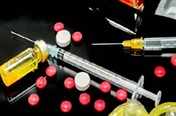
HIV isn’t spread through casual contact with other people, such as hugging, sharing cutlery or shaking hands – the virus simply doesn’t survive long outside of the body. It’s also not spread through sweat, tears, vomit, faeces or urine.
The virus is spread by means of direct contact with an infected person’s semen, vaginal fluid, blood or breast milk. HIV is most commonly spread through unprotect vaginal, anal and oral sex. It’s also often spread by people who inject drugs (and who use the same needles as an infected person).
Start by following these steps to reduce your risk of getting HIV:
- Know your HIV status. If you don’t get tested, you won’t know if you’re HIV positive or not. During the first three months of infection (the ‘window period’), it’s hard to pick up the virus in the body. That’s why testing every six months is the best way to be sure.
- Know your partner’s HIV status. You and your partner should both get tested before you have sex for the first time. You can’t rely on being this person’s only sexual partner. People are sometimes reluctant to disclose their sexual habits.
- Never have sex without a condom. You simply have to make this a rule if you want to reduce your chances of becoming HIV positive. Make sure you know how to use a condom correctly.
- Practise safe sex. Kissing, erotic massage and mutual masturbation are all examples of safer sex activities. You can’t get HIV from doing these things. Oral sex without a condom or dental dam isn’t recommended, but it’s still safer than having unprotected sex.
- Be faithful. Don’t sleep around. If you and your partner have both been tested, you’re both HIV negative and you’re faithful to one another, you can’t get HIV from sexual contact. Experts recommend that you have two HIV tests six months apart when neither of you has had any new sexual partners in between. It’s the only way to be sure.
- Avoid having sex. This isn’t easy for most people, but it’s the one way of making absolutely sure that you don’t become HIV positive as a result of sexual contact. If you’re still a virgin, try to delay your sexual debut.
- Stay away from drugs. If you’re unable to do this, make sure you use clean needles and equipment and that you don’t share needles with other drug users. Note that one of the consequences of drug use is also that being high can make you forget about the rules of safe sex.
- Avoid blood contact. If you’re helping a bleeding person, avoid getting any of their blood into any sores or cuts you may have on your skin. Also protect your eyes and mouth. There should be gloves in all first-aid kits – use them.
- Transmission in pregnancy. If you’re pregnant and don’t know your HIV status, get tested. If you’re HIV-positive, taking antiretroviral treatment (ART) during your pregnancy and when you deliver the baby will greatly reduce the chances of transmitting HIV to your baby.
- Consider circumcision. This procedure, in which the foreskin of the penis is removed, has been shown to reduce the risk of HIV transmission from women to men.
- Take action if you’ve been exposed to HIV. Post-exposure prophylaxis (PEP) means taking antiretroviral treatment after you’ve been exposed to HIV. It must be taken within 72 hours of exposure and reduces your chances of becoming HIV-positive. PEP is often given to people who work in a medical environment (after a needle-prick incident) and to those who have been sexually assaulted or shared drug needles. PEP must be taken for 28 days and has some side effects, such as nausea. Note that it’s not a substitute for normal HIV preventative measures.
- Consider pre-exposure prophalaxis (PrEP). This means taking medication to prevent HIV infection if you’re at high risk of getting infected. In South Africa, a drug named Truvada (a combination of emtricitabine and tenofovir) is proving to be particularly useful among sex workers. If you’re using PrEP, it’s important to take the drugs exactly as prescribed and to use other preventative measures (e.g. condoms) if you can.
Treatment as prevention (TasP)
These days, there’s also much focus on treatment as prevention (TasP). This refers to HIV prevention methods and programmes that use antiretroviral treatment (ART) to decrease the risk of HIV transmission.
Experts now know that if an HIV-positive person’s viral load is so suppressed that it’s undetectable, they’re unlikely to pass the virus on to others. So, for example, if an HIV-positive woman who has an undetectable viral load has sex with her HIV-negative partner, she’s unlikely to pass on the disease. If this woman falls pregnant, she’s also unlikely to transmit the virus to her child.
Two recent studies conducted among heterosexual couples demonstrated that HIV-positive people who are on ART are about 20 times less likely to transmit the virus to their HIV-negative partners than people who are not using the medication.
Preventing opportunistic infections
Preventative treatment for opportunistic infections covers primary prevention (preventing illness before it occurs) and secondary prevention (preventing a disease that you’ve had in the past from coming back).
When HIV-positive people contract an opportunistic infection, both the infection and the HIV become harder to treat because of drug interactions. Healthcare professionals wouldn’t, for instance, treat TB and AIDS at the same time because of the drug load.
For this reason, it’s extremely important that you live a healthy lifestyle to give your body a fighting chance against HIV. It’s also crucial that you follow steps to reduce your risk of exposure to opportunistic infections.
All children and adults who have started to show signs of disease (or who have a CD4 count of less than 350), should take an antibiotic called co-trimoxazole continuously. This prevents Pneumocystis jerovici pneumonia (PJP), the most common opportunistic infection in people who are HIV positive. Adults and children who have had TB, or who have contact with people with TB (especially at home), should also take anti-TB medication.
Children should receive their routine vaccinations but, if they already have AIDS, they shouldn’t get the vaccine against TB. Extra vaccinations may be recommended in both adults and children.
Other ways to prevent opportunistic infections include:
- Washing your hands regularly.
- Using hand sanitiser after touching gym equipment or other surfaces in public spaces.
- Avoiding raw or undercooked meals. Wash and cook all your foods.
- Steering clear of people who are ill, as they might infect you.
- Disinfecting all cooking implements and surfaces.
- Practising safe sex.
- Not cleaning cat litter trays or picking up dog faeces without using gloves.
How to prevent the progression to AIDS
Generally speaking, if you’re HIV-positive, there could come a time when your body’s immune system becomes so weak that you can no longer fight off opportunistic infections. This is when HIV progresses to AIDS, or Acquired Immune Deficiency Syndrome.
The good news is that, as long as you take your antiretroviral treatment (ART) daily and maintain a healthy lifestyle, you’re unlikely to progress to the AIDS stage of the disease. The treatment can halt the progress of the disease and allow your immune system to rebuild itself.
AIDS as such isn’t a disease – it merely describes the stage when HIV has progressed to such an extent that the body’s CD4 count drops below 200. ART can raise the CD4 count again to above 500. It’s essential that you follow your doctor’s instructions on taking these drugs, as they can and do save lives. Also have your CD4 count checked regularly.
Preventative treatment for opportunistic infections
Preventative treatment for opportunistic infections covers primary prevention (i.e. preventing illness before it occurs) and secondary prevention (i.e. preventing a disease that a person has already had from coming back).
Co-trimoxazole (CTX) preventative therapy, for example, provides protection against opportunistic infections such as Pneumocystis jerovici pneumonia, toxoplasmosis, malaria and other bacterial infections. This fixed-dose combination of two antimicrobial drugs (sulfamethoxazole and trimethoprim) has been shown to reduce hospitalisations and death.
This treatment is a cost-effective, well-tolerated intervention for people living with HIV/AIDS, and is therefore widely prescribed for adults (including pregnant women) with severe or advanced HIV and/or with a CD4 count of 350 or less.
Post-exposure prophylaxis (PEP)
Prophylaxis refers to the prevention or protective treatment of disease. In the context of HIV, post-exposure prophylaxis (PEP) refers to antiretroviral treatment that’s given to someone to help prevent HIV infection after being exposed to the virus.
Healthcare workers who are accidentally exposed to HIV through, for example, a needle-prick accident, should start taking ART (usually AZT and 3TC) as soon as possible after the incident and preferably within 24 hours. The drugs must be taken for 28 days.
From analysing thousands of accidental exposures in healthcare workers, it’s been calculated that even though the risk of getting HIV infection from such an accident is quite low (0.3% of cases), taking ART reduces the risk of infection by about 80%.
The South African Government now also funds ART in the context of rape and women who have been raped should start ART as soon as possible. Note that PEP may be difficult to obtain outside of large hospitals. Get in touch with a rape centre in your area or ask the local police to point you to a facility where you’ll be assisted.
A doctor or clinic nurse will assess your risk of HIV infection before starting treatment with PEP. Remember that it’s best to start PEP within 24 hours, but certainly within 72 hours.
Read more
Disease related to HIV/AIDS
Reviewed by Dr Pooja Balani, MBBS (UK). Medical Technical Advisor at the Southern African HIV Clinicians Society. March 2018.




 Publications
Publications
 Partners
Partners












